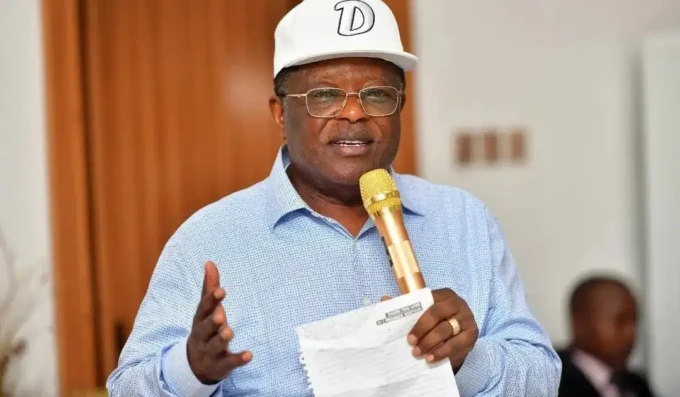The National Human Rights Commission (NHRC) of Nigeria reported a troubling 25% increase in human rights violation complaints in February 2025, with the figure rising to 205,364 from 169,850 in January. This alarming escalation was announced by NHRC Executive Secretary Dr. Tony Ojukwu during the presentation of the February 2025 Human Rights Dashboard in Abuja on Wednesday, March 5, 2025. The monthly dashboard provides a detailed breakdown of the human rights landscape across Nigeria, shedding light on persistent and emerging challenges.
Dr. Ojukwu highlighted a disturbing upward trend in violations, noting that February’s data revealed widespread issues, including mass killings and abductions in the North-West and North-Central regions, cult-related violence, inter- and intra-communal clashes, extrajudicial killings by police and armed forces, a resurgence of Boko Haram attacks, and a spike in rape cases. Specific figures underscored the gravity of the situation: 341 rape complaints, 136 cases of sexual violence, 6,954 domestic violence incidents, 1,400 child abandonment cases, 191 killings (including 45 from communal clashes), 144 abductions, and 121 deaths from vehicle accidents were recorded. The NHRC also flagged emerging concerns like rising suicide rates and attacks on academic communities, alongside recurring issues such as cultism and accidental deaths.
The Commission expressed unease over new state-level legislation aimed at curbing insecurity, which could inadvertently threaten citizens’ rights. Ojukwu cited laws like the Edo State Secret Cult and Similar Activities (Prohibition) Law 2025, the Anambra Homeland Security Law 2025, and the Edo State Kidnapping Prohibition Law 2025, which impose severe penalties, including the death penalty, for cultism and kidnapping. He cautioned that while these measures address serious crimes, they must align with international human rights standards to protect the rights of the accused. Similarly, the proposed death penalty for counterfeit drug offenses by the National Agency for Food and Drug Administration Control (NAFDAC) has sparked debate about balancing punishment with human rights.
Economic hardship was identified as a key driver of the 1,400 reported child abandonment cases, prompting the NHRC to introduce a Child Safeguarding Policy. This initiative aims to protect children and young people accessing NHRC services, ensuring their dignity and rights are upheld amid worsening socio-economic conditions. Ojukwu emphasized the policy’s role in supporting frontline human rights defenders, particularly in addressing the vulnerabilities of women and children.
A significant portion of complaints implicated state actors, particularly security agencies, reinforcing the need for accountability in law enforcement. Ojukwu stressed that the 205,364 complaints reflect ongoing challenges in safeguarding human rights, with state actors topping the list of perpetrators. “Despite our efforts, those entrusted with enforcing the law are sometimes the violators,” he said, calling for a renewed focus on aligning law enforcement practices with human rights norms and swiftly addressing abuses. As Nigeria grapples with this crisis, the NHRC’s findings underscore the urgent need for systemic reforms to protect citizens and restore trust in state institutions.












Is there a correlation between economic instability and the surge in human rights violations in Nigeria? Lets discuss!
Do you think international pressure is the only solution to curb human rights violations in Nigeria, or should we focus on internal reforms?
Is Nigeria on the brink of a human rights crisis? The surge in violations demands urgent action! #humanrights #Nigeria
Is the government really taking action or just turning a blind eye to these violations? Its time for accountability!
Is anyone else shocked by the 25% surge in human rights violations in Nigeria? Whats happening there?
Is the government turning a blind eye to these violations? Its alarming how the numbers keep rising. Something needs to change.
Can we just ignore the facts and pretend everything is fine in Nigeria? Human rights violations should not be brushed aside.
Is the government turning a blind eye to these violations, or are they actively involved? Something seems fishy!
I dont know about you guys, but this surge in human rights violations in Nigeria is seriously alarming. Can we ignore it?
Do you think international intervention is necessary to address the human rights crisis in Nigeria? Lets discuss!
Does anyone else think international pressure should be ramped up to address this alarming surge in human rights violations in Nigeria?
Is this surge in human rights violations in Nigeria really surprising? The situation seems dire and calls for urgent action.
Do you think international intervention is needed to address the human rights crisis in Nigeria? Lets discuss!
Is the government even trying to address these violations, or are they turning a blind eye? Its alarming!
Can we ignore the human rights violations in Nigeria because its not happening in our backyard? We need to care.
I cant believe the situation in Nigeria keeps getting worse. When will the government step up and protect its people?